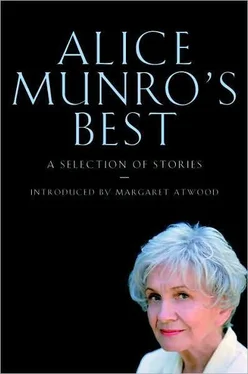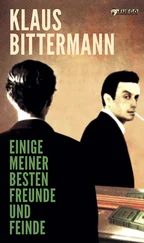“Macaroni, pepperoni, Botticelli, beans–”
What could that mean? Rose used to repeat such things to herself. She could never ask him. The person who spoke these words and the person who spoke to her as her father were not the same, though they seemed to occupy the same space. It would be the worst sort of taste to acknowledge the person who was not supposed to be there; it would not be forgiven. Just the same, she loitered and listened.
The cloud-capped towers, she heard him say once.
“The cloud-capped towers, the gorgeous palaces.”
That was like a hand clapped against Rose’s chest, not to hurt, but astonish her, to take her breath away. She had to run then, she had to get away. She knew that was enough to hear, and besides, what if he caught her? It would be terrible.
This was something the same as bathroom noises. Flo had saved up and had a bathroom put in, but there was no place to put it except in a corner of the kitchen. The door did not fit, the walls were only beaverboard. The result was that even the tearing of a piece of toilet paper, the shifting of a haunch, was audible to those working or talking or eating in the kitchen. They were all familiar with each other’s nether voices, not only in their more explosive moments but in their intimate sighs and growls and pleas and statements. And they were all most prudish people. So no one ever seemed to hear, or be listening, and no reference was made. The person creating the noises in the bathroom was not connected with the person who walked out.
They lived in a poor part of town. There was Hanratty and West Hanratty, with the river flowing between them. This was West Hanratty. In Hanratty the social structure ran from doctors and dentists and lawyers down to foundry workers and factory workers and draymen; in West Hanratty it ran from factory workers and foundry workers down to large improvident families of casual bootleggers and prostitutes and un successful thieves. Rose thought of her own family as straddling the river, belonging nowhere, but that was not true. West Hanratty was where the store was and they were, on the straggling tail end of the main street. Across the road from them was a blacksmith shop, boarded up about the time the war started, and a house that had been another store at one time. The Salada Tea sign had never been taken out of the front window; it remained as a proud and interesting decoration though there was no Salada Tea for sale inside. There was just a bit of sidewalk, too cracked and tilted for roller-skating, though Rose longed for roller skates and often pictured herself whizzing along in a plaid skirt, agile and fashionable. There was one streetlight, a tin flower; then the amenities gave up and there were dirt roads and boggy places, front-yard dumps and strange-looking houses. What made the houses strange-looking were the attempts to keep them from going completely to ruin. With some the attempt had never been made. These were gray and rotted and leaning over, falling into a landscape of scrub hollows, frog ponds, cattails, and nettles. Most houses, however, had been patched up with tarpaper, a few fresh shingles, sheets of tin, hammered-out stovepipes, even cardboard. This was, of course, in the days before the war, days of what would later be legendary poverty, from which Rose would remember mostly low-down things — serious-looking anthills and wooden steps, and a cloudy, interesting, problematical light on the world.
THERE WAS A LONG truce between Flo and Rose in the beginning. Rose’s nature was growing like a prickly pineapple, but slowly, and secretly, hard pride and skepticism overlapping, to make something surprising even to herself. Before she was old enough to go to school, and while Brian was still in the baby carriage, Rose stayed in the store with both of them — Flo sitting on the high stool behind the counter, Brian asleep by the window; Rose knelt or lay on the wide creaky floorboards, working with crayons on pieces of brown paper too torn or irregular to be used for wrapping.
People who came to the store were mostly from the houses around. Some country people came too, on their way home from town, and a few people from Hanratty, who walked across the bridge. Some people were always on the main street, in and out of stores, as if it was their duty to be always on display and their right to be welcomed. For instance, Becky Tyde.
Becky Tyde climbed up on Flo’s counter, made room for herself beside an open tin of crumbly jam-filled cookies.
“Are these any good?” she said to Flo, and boldly began to eat one. “When are you going to give us a job, Flo?”
“You could go and work in the butcher shop,” said Flo innocently. “You could go and work for your brother.”
“Roberta?” said Becky with a stagey sort of contempt. “You think I’d work for him?” Her brother who ran the butcher shop was named Robert but often called Roberta, because of his meek and nervous ways. Becky Tyde laughed. Her laugh was loud and noisy like an engine bearing down on you.
She was a big-headed loud-voiced dwarf, with a mascot’s sexless swagger, a red velvet tam, a twisted neck that forced her to hold her head on one side, always looking up and sideways. She wore little polished high-heeled shoes, real lady’s shoes. Rose watched her shoes, being scared of the rest of her, of her laugh and her neck. She knew from Flo that Becky Tyde had been sick with polio as a child, that was why her neck was twisted and why she had not grown any taller. It was hard to believe that she had started out differently, that she had ever been normal. Flo said she was not cracked, she had as much brains as anybody, but she knew she could get away with anything.
“You know I used to live out here?” Becky said, noticing Rose. “Hey! What’s-your-name! Didn’t I used to live out here, Flo?”
“If you did it was before my time,” said Flo, as if she didn’t know anything.
“That was before the neighborhood got so downhill. Excuse me saying so. My father built his house out here and he built his slaughterhouse and we had half an acre of orchard.”
“Is that so?” said Flo, using her humoring voice, full of false geniality, humility even. “Then why did you ever move away?”
“I told you, it got to be such a downhill neighborhood,” said Becky. She would put a whole cookie in her mouth if she felt like it, let her cheeks puff out like a frog’s. She never told any more.
Flo knew anyway, and who didn’t. Everyone knew the house, red brick with the veranda pulled off and the orchard, what was left of it, full of the usual outflow — car seats and washing machines and bed-springs and junk. The house would never look sinister, in spite of what had happened in it, because there was so much wreckage and confusion all around.
Becky’s old father was a different kind of butcher from her brother, according to Flo. A bad-tempered Englishman. And different from Becky in the matter of mouthiness. His was never open. A skinflint, a family tyrant. After Becky had polio he wouldn’t let her go back to school. She was seldom seen outside the house, never outside the yard. He didn’t want people gloating. That was what Becky said, at the trial. Her mother was dead by that time and her sisters married. Just Becky and Robert at home. People would stop Robert on the road and ask him, “How about your sister, Robert? Is she altogether better now?”
“Yes.”
“Does she do the housework? Does she get your supper?”
“Yes.”
“And is your father good to her, Robert?”
The story being that the father beat them, had beaten all his children and beaten his wife as well, beat Becky more now because of her deformity, which some people believed he had caused (they did not understand about polio). The stories persisted and got added to. The reason that Becky was kept out of sight was now supposed to be her pregnancy, and the father of the child was supposed to be her own father. Then people said it had been born, and disposed of.
Читать дальше












